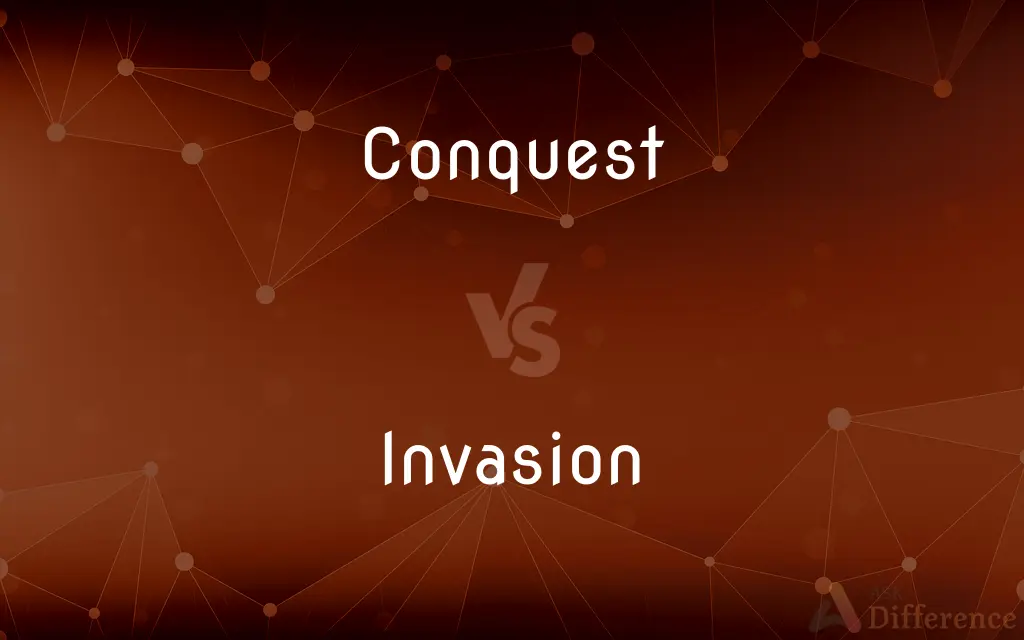Conquest vs. Invasion — What's the Difference?
By Fiza Rafique & Urooj Arif — Updated on April 19, 2024
Conquest involves subjugation and control following victory, often leading to long-term dominance; invasion is the act of entering another area forcefully, primarily to begin conquest or war.

Difference Between Conquest and Invasion
Table of Contents
ADVERTISEMENT
Key Differences
Conquest refers to the act of overcoming and gaining control over a country or group, often through military victory, which results in long-term governance and integration. On the other hand, invasion is primarily the aggressive entry into foreign territory with the intent of conquering or looting, without immediate plans for long-term control.
Conquests are usually the result of prolonged efforts that not only include military actions but also the establishment of political or cultural dominance. Whereas invasions can be relatively short-term events, focused on immediate military objectives rather than extended governance.
A conquest typically implies the successful integration or assimilation of the conquered people into the conqueror's empire or state. In contrast, an invasion might lead to occupation or temporary control, but does not necessarily result in the assimilation of populations.
Historically, conquests have led to significant changes in the social, cultural, and political landscapes of the conquered territories. Invasions, however, are often characterized by their destructive impact, leading to resistance, upheaval, and often international conflicts.
Conquests may be viewed in some contexts as a means of spreading culture, religion, or ideology. Conversely, invasions are frequently perceived as acts of aggression, provoking strong nationalistic and defensive responses from the invaded populace.
ADVERTISEMENT
Comparison Chart
Objective
Establish long-term control and assimilate territories
Achieve military dominance and exploit resources
Duration
Long-term, following sustained effort
Short-term, with immediate goals
Outcome
Integration into conqueror's domain
Temporary control, often without assimilation
Historical Impact
Cultural and administrative changes
Disruption, resistance, and potential for further conflict
Perception
Often seen as empire-building
Viewed as aggressive and hostile
Compare with Definitions
Conquest
The act of conquering a country or territory.
The Norman conquest of England in 1066 changed the course of British history.
Invasion
An instance of invading a country or region with an armed force.
The invasion of Normandy in 1944 was a turning point in World War II.
Conquest
The subjugation and assumption of control of a place or people by military force.
The conquest of the Aztec Empire by the Spaniards was both brutal and decisive.
Invasion
The act of entering as if to take possession.
The quiet invasion of technology into every aspect of our lives is undeniable.
Conquest
The overcoming of a problem or weakness.
Her conquest of her fear of heights was truly inspiring.
Invasion
An incursion by a large number of people or things into a place or sphere of activity.
The annual invasion of tourists to the small island can be overwhelming.
Conquest
A victory gained through conflict, typically involving the subjugation of a people.
His conquest of the rival business was complete after a long takeover battle.
Invasion
An unwelcome intrusion into another's domain.
The invasion of privacy through unauthorized data collection is a hot topic today.
Conquest
A person whose favor or heart has been won.
He boasted about his conquests in love as if they were battles won.
Invasion
The spread of something, usually undesirable, into a new area.
The invasion of these non-native species threatens the local wildlife.
Conquest
Conquest is the act of military subjugation of an enemy by force of arms. Military history provides many examples of conquest: the Roman conquest of Gaul, the Mauryan conquest of Afghanistan and of vast areas of the Indian subcontinent, the Spanish conquest of the Aztec Empire and various Arab conquests, all of which were successful in bringing foreign states under the conquerors' control.
Invasion
An invasion is a military offensive in which large numbers of combatants of one geopolitical entity aggressively enter territory owned by another such entity, generally with the objective of either conquering; liberating or re-establishing control or authority over a territory; forcing the partition of a country; altering the established government or gaining concessions from said government; or a combination thereof. An invasion can be the cause of a war, be a part of a larger strategy to end a war, or it can constitute an entire war in itself.
Conquest
The act or process of conquering
The Spanish conquest of Mexico.
The conquest of an infectious disease.
The conquest of shyness.
Invasion
The act of invading, especially the entrance of an armed force into a territory to conquer.
Conquest
Something, such as territory, acquired by conquering.
Invasion
The entry into bodily tissue and subsequent proliferation of an injurious entity, such as a pathogen or tumor.
Conquest
A person or group whose affection or admiration has been gained
The pianist made a conquest of every audience on the tour.
Invasion
An intrusion or encroachment
Your reading her diary was an invasion of her privacy.
Conquest
A person who has been seduced by another.
Invasion
A military action consisting of armed forces of one geopolitical entity entering territory controlled by another such entity, generally with the objective of conquering territory or altering the established government.
Conquest
Victory gained through combat; the subjugation of an enemy.
Invasion
The entry without consent of an individual or group into an area where they are not wanted.
An invasion of mobile phones
An invasion of bees
An invasion of foreign tourists
Conquest
An act or instance of overcoming an obstacle.
Invasion
(medicine) The spread of cancer cells, bacteries and such to the organism.
Conquest
That which is conquered; possession gained by force, physical or moral.
Invasion
(surgery) The breaching of the skin barrier.
Conquest
The acquiring of property by other means than by inheritance; acquisition.
Invasion
The act of invading; the act of encroaching upon the rights or possessions of another; encroachment; trespass.
Conquest
(video games) A competitive mode found in first-person shooter games in which competing teams (usually two) attempt to take over predetermined spawn points labeled by flags.
Invasion
A warlike or hostile entrance into the possessions or domains of another; the incursion of an army for conquest or plunder.
Conquest
(archaic) To conquer.
Invasion
The incoming or first attack of anything hurtful or pernicious; as, the invasion of a disease.
Conquest
(marketing) To compete with an established competitor by placing advertisements for one's own products adjacent to editorial content relating to the competitor or by using terms and keywords for one's own products that are currently associated with the competitor.
Invasion
The act of invading; the act of an army that invades for conquest or plunder
Conquest
The act or process of conquering, or acquiring by force; the act of overcoming or subduing opposition by force, whether physical or moral; subjection; subjugation; victory.
In joys of conquest he resigns his breath.
Three years sufficed for the conquest of the country.
Invasion
Any entry into an area not previously occupied;
An invasion of tourists
An invasion of locusts
Conquest
That which is conquered; possession gained by force, physical or moral.
Wherefore rejoice? What conquest brings he home?
Invasion
(pathology) the spread of pathogenic microorganisms or malignant cells to new sites in the body;
The tumor's invasion of surrounding structures
Conquest
The acquiring of property by other means than by inheritance; acquisition.
Conquest
The act of gaining or regaining by successful struggle; as, the conquest of liberty or peace.
Conquest
The act of conquering
Conquest
Success in mastering something difficult;
The conquest of space
Common Curiosities
What are typical outcomes of conquests?
Typical outcomes of conquests include integration of the conquered territories into the conqueror's domain and significant cultural and administrative changes.
How does an invasion differ from an attack?
An invasion involves entering foreign territories on a large scale, usually aiming to take control, whereas an attack can be a more limited action with specific targets.
Are all invasions considered illegal?
Many invasions violate international law, especially when conducted without the justification of self-defense or sanctioned by international bodies.
What motivates a country to invade another?
Motivations can include resource exploitation, strategic advantage, or pre-emptive military objectives to neutralize a perceived threat.
How do historical contexts affect the perception of invasions?
Historical contexts can shape whether invasions are seen as justified or aggressive, depending on the era's values and the outcomes of the invasion.
What legal repercussions can follow an invasion?
Legal repercussions can include international sanctions, war crime charges, and reparative demands from international courts.
What are the immediate effects of an invasion?
Immediate effects of an invasion include disruption, potential destruction, and the beginning of resistance or conflict.
Is conquest always military?
While conquest is often military, it can also occur through cultural or ideological dominance without direct conflict.
What role does diplomacy play in conquests?
Diplomacy can be used to consolidate power, negotiate surrender, or integrate a conquered people more peacefully.
What is the main goal of a conquest?
The main goal of a conquest is to subjugate and assimilate the conquered area into the conqueror’s territory, establishing long-term control.
Can an invasion lead to a conquest?
Yes, an invasion can lead to a conquest if the invaders establish lasting control over the invaded area.
Can an invasion be peaceful?
An invasion inherently involves entering a territory forcefully and is usually not peaceful, though the level of violence can vary.
How do conquests influence world history?
Conquests have often reshaped political borders, cultures, and societies, playing a crucial role in the development of nations and empires.
What can be done to prevent invasions?
Preventative measures include diplomacy, defense alliances, and maintaining a strong military deterrent to discourage aggressive actions.
How do invasions affect civilians?
Invasions often lead to civilian hardship, including displacement, loss of life, and disruption of daily life.
Share Your Discovery

Previous Comparison
Opening vs. Vernissage
Next Comparison
Significance vs. SignificativityAuthor Spotlight
Written by
Fiza RafiqueFiza Rafique is a skilled content writer at AskDifference.com, where she meticulously refines and enhances written pieces. Drawing from her vast editorial expertise, Fiza ensures clarity, accuracy, and precision in every article. Passionate about language, she continually seeks to elevate the quality of content for readers worldwide.
Co-written by
Urooj ArifUrooj is a skilled content writer at Ask Difference, known for her exceptional ability to simplify complex topics into engaging and informative content. With a passion for research and a flair for clear, concise writing, she consistently delivers articles that resonate with our diverse audience.














































